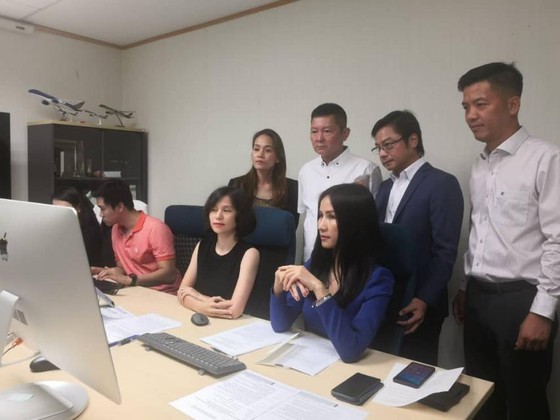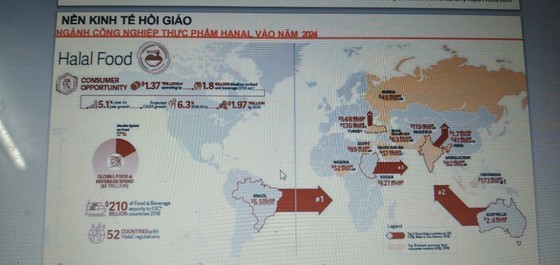
The seminar attracted the participation of representatives from Kuala Lumpur in Malaysia, Ho Chi Minh City in Vietnam, Udon Thani in Thailand, and enterprises of Vietnam and Malaysia.
Participants in the seminar focused on discussing, exchanging, and commenting on the key contents, including two-way trade between Vietnam and Malaysia and its strengths, Vietnam's export experience, and highlights of trade between Vietnam and the world on medical equipment and supplies during the Covid-19 pandemic and the next two years, Halal certification and the strengths of Halal products - products that Muslims are allowed to eat, drink, and use - in the Malaysian market, and the advantages and disadvantages when importing Vietnamese goods into the Malaysian market.
Mr. Pham Quoc Anh, Vietnam Trade Counselor in Malaysia, said the structure of the types of goods exchanged and imported between Vietnam and Malaysia is not competitive but complementary, so there are many growth opportunities. The main products that Malaysia exports to Vietnam include electric machines, mechanical machinery and equipment, plastics and plastic products, gasoline, and oil of all kinds. Meanwhile, the main products that Vietnam exports to Malaysia are rice, bags, footwear, textiles, aquatic products, coffee, and tea.
Participants in the seminar focused on discussing, exchanging, and commenting on the key contents, including two-way trade between Vietnam and Malaysia and its strengths, Vietnam's export experience, and highlights of trade between Vietnam and the world on medical equipment and supplies during the Covid-19 pandemic and the next two years, Halal certification and the strengths of Halal products - products that Muslims are allowed to eat, drink, and use - in the Malaysian market, and the advantages and disadvantages when importing Vietnamese goods into the Malaysian market.
Mr. Pham Quoc Anh, Vietnam Trade Counselor in Malaysia, said the structure of the types of goods exchanged and imported between Vietnam and Malaysia is not competitive but complementary, so there are many growth opportunities. The main products that Malaysia exports to Vietnam include electric machines, mechanical machinery and equipment, plastics and plastic products, gasoline, and oil of all kinds. Meanwhile, the main products that Vietnam exports to Malaysia are rice, bags, footwear, textiles, aquatic products, coffee, and tea.
 The Halal food industry attracts attention of overseas Vietnamese entrepreneurs. (Photo: SGGP)
The Halal food industry attracts attention of overseas Vietnamese entrepreneurs. (Photo: SGGP)
According to Mr. Anh, Malaysia is a fairly large market with a population of nearly 32 million people and a high per-capita income. This is a country with extremely good trade relations with Muslim countries, such as Indonesia and countries in the Middle East. Therefore, when entering the Malaysian market, it means there will be an opportunity to penetrate the Halal product market with an annual demand of more than US$2 trillion.
Besides, Malaysia is an industrialized country that has a huge import demand for food products, such as rice, coffee, vegetables, aquatic products, and confectionery, so although the Covid-19 pandemic has been affecting greatly to world trade in general and trade between the two countries in particular, it still opens up opportunities for Vietnamese enterprises to bring these products into the Malaysian market. And currently, Vietnam is one of the largest suppliers of the aforesaid products to the Malaysian market.
Exchanging and sharing experiences of Vietnam about the highlights of trade between Vietnam and the world on medical equipment and supplies amid the Covid-19 pandemic, Mr. Peter Hong, Permanent Vice President of the BAOOV said that in recent months, Vietnam has controlled well the Covid-19 pandemic, creating positive impacts on Vietnam's reputation and position in the world. This is a golden opportunity for the world to know Vietnam as one of the safe destinations for business investment, as well as trade promotion activities in the coming time. However, the situation of the pandemic in many markets in Europe, the United States, and the ASEAN has not been controlled, so the application of pandemic prevention measures greatly affects the import and export activities of Vietnam. Therefore, solutions to boost exports and diversify export markets are extremely necessary for the business community, especially import-export businesses, in the post-pandemic period.
At the seminar, overseas entrepreneurs also exchanged experiences and shared about making full use of trade agreements to promote exports. Of which, the Comprehensive and Progressive Agreement for Trans-Pacific Partnership (CPTPP) and the EU-Vietnam Free Trade Agreement (EVFTA) are two of the remarkable trade agreements that Vietnam needs to focus on research and evaluation to make the most of opportunities to promote import and export activities. Especially, Vietnam should focus on exporting to markets and regions that have controlled the pandemic early and have had free trade agreements with it.
Besides, Malaysia is an industrialized country that has a huge import demand for food products, such as rice, coffee, vegetables, aquatic products, and confectionery, so although the Covid-19 pandemic has been affecting greatly to world trade in general and trade between the two countries in particular, it still opens up opportunities for Vietnamese enterprises to bring these products into the Malaysian market. And currently, Vietnam is one of the largest suppliers of the aforesaid products to the Malaysian market.
Exchanging and sharing experiences of Vietnam about the highlights of trade between Vietnam and the world on medical equipment and supplies amid the Covid-19 pandemic, Mr. Peter Hong, Permanent Vice President of the BAOOV said that in recent months, Vietnam has controlled well the Covid-19 pandemic, creating positive impacts on Vietnam's reputation and position in the world. This is a golden opportunity for the world to know Vietnam as one of the safe destinations for business investment, as well as trade promotion activities in the coming time. However, the situation of the pandemic in many markets in Europe, the United States, and the ASEAN has not been controlled, so the application of pandemic prevention measures greatly affects the import and export activities of Vietnam. Therefore, solutions to boost exports and diversify export markets are extremely necessary for the business community, especially import-export businesses, in the post-pandemic period.
At the seminar, overseas entrepreneurs also exchanged experiences and shared about making full use of trade agreements to promote exports. Of which, the Comprehensive and Progressive Agreement for Trans-Pacific Partnership (CPTPP) and the EU-Vietnam Free Trade Agreement (EVFTA) are two of the remarkable trade agreements that Vietnam needs to focus on research and evaluation to make the most of opportunities to promote import and export activities. Especially, Vietnam should focus on exporting to markets and regions that have controlled the pandemic early and have had free trade agreements with it.
























